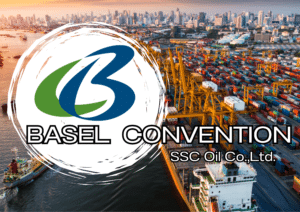How should hazardous waste from ships be managed?
Currently, there is a large amount of hazardous waste generated in the shipping industry. Therefore, waste must be disposed of properly so as not to affect the environment.
In order to protect the natural resources of the sea and reduce the impact on aquatic life, the operation of waste disposal from ships must strictly comply with the law and must take into account the source of disposal to be in compliance with the law.

Laws and standards related to waste management from ships
The management of waste from ships must comply with laws and standards set by various organizations such as:
- International Maritime Organization (IMO): Regulations on the management of ship waste that are applicable worldwide.
- Marpol Convention: Regulations for the Prevention of Pollution from Ships at Sea
- Announcement: Department of Marine and Coastal Resources regulations applicable to the transport of hazardous waste from the port

What is the MARPOL Convention? Why is it important?
MARPOL is an international set of regulations established by the International Maritime Organization (IMO) to control and prevent marine pollution from shipping. It is divided into six annexes, each of which covers a different aspect of marine pollution:
1. Prevention of oil pollution (Appendix I)
Annex I of MARPOL focuses on preventing oil spills into the sea. It provides measures to control the release of oil from ships, such as installing equipment to collect oil, treating oil waste, and maintaining oil release control systems. These measures help reduce the risk of accidents and oil spills into the sea.
2. Control of pollution from chemicals transported in bulk (Appendix II)
Annex II of MARPOL focuses on controlling pollution from chemicals transported in liquid form in large quantities, such as dangerous chemicals that can pollute the sea, by setting conditions for the loading, handling and discharge of chemical wastes to ensure safe maritime transport and to prevent harm to the marine environment.
3. Prevention of pollution from packaged chemicals (Appendix III)
Annex III provides guidelines for the transport of chemicals packaged in general cargoes, such as hazardous materials and toxic substances. The regulations in this Annex cover safe packaging, including measures to prevent leakage or breakage of packages, which reduces the risk of contamination of the sea in the event of an unexpected event.
4. Control of pollution emissions from wastewater treatment on ships (Appendix IV)
Annex IV covers the treatment and discharge of wastewater from ships. It requires all ships to have wastewater treatment systems and safe management procedures so that wastewater discharged into the sea does not cause harm to aquatic life and the ecosystem, including setting the distances at which ships can discharge wastewater outside territorial waters.
5. Prevention of pollution from waste dumped from ships (Appendix V)
Annex V contains regulations on the management of waste generated by ships, which includes plastic waste, food waste, scrap metal and other materials prohibited from being discharged into the sea. Ships are required to have waste management systems in place and dumping of waste into the sea is prohibited, except in cases where waste does not have an environmental impact, such as biodegradable food waste.
6. Control of air pollution emissions from ships (Annex VI)
Annex VI focuses on reducing emissions of climate change-affecting gases and air pollution from ships, such as sulphur dioxide (SOx) and nitrogen oxides (NOx), requiring the use of low-sulphur fuels and the use of combustion mitigation technologies to reduce impacts on air quality at sea and in coastal areas.
summarize
Waste disposal from ships must be done properly and must strictly comply with the law, especially the MARPOL Convention, which is an IMO regulation that controls marine pollution from shipping. It is divided into 6 annexes: prevention of pollution by oil, chemicals, garbage, wastewater, and air pollution, which help protect the marine environment and make shipping safe and sustainable.

Where are the companies that dispose of ship waste?
SSC OIL CO., LTD. Ready to be a consultant in receiving waste disposal from ocean-going ships. The process of recycling waste from ships is in accordance with the law and has emergency response measures in case of spills during transportation. In addition, there is a waste collection service from ports that have been registered and requested permission from the Harbor Department to collect waste.
contact SSC OIL CO., LTD.
Address: 52 Moo 16, Nong Hiang Subdistrict, Phanat Nikhom District, Chonburi Province 20140
Phone: 02-026-6547
Fax: 038-198-652
Email : sale@thailandwastemanagement.com













